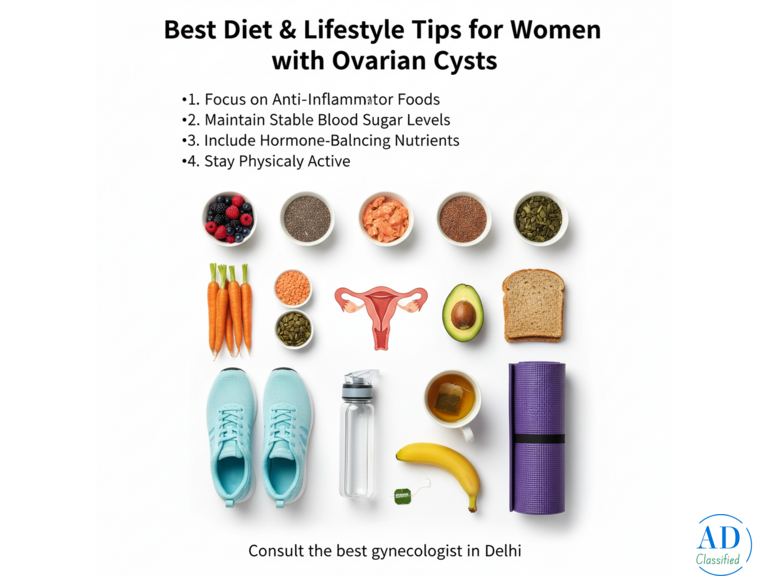Best Diet & Lifestyle Tips for Women with Ovarian Cysts
Free
Published date: 2025/10/09
- Location: Gurgaon, Delhi, Delhi, India
Name: Dr Buchun Mishra
Phone: 0890439xxxx
Ovarian cysts are small, fluid-filled sacs that form in or on a woman’s ovaries. While many cysts are harmless and disappear on their own, some can cause pain, irregular periods, or fertility issues if left untreated. Along with medical treatment, adopting a balanced diet and lifestyle can make a significant difference in managing ovarian cysts naturally.
If you are under the care of the best gynecologist in Delhi, these expert-backed tips can support your recovery and overall reproductive health.
1. Focus on Anti-Inflammatory Foods
Chronic inflammation can worsen hormonal imbalance and cyst formation. Add foods rich in antioxidants and omega-3 fatty acids, such as berries, walnuts, chia seeds, flaxseeds, olive oil, and salmon. Green leafy vegetables like spinach and kale help detoxify the liver, which plays a vital role in hormone regulation.
Avoid fried foods, processed snacks, and refined sugar that trigger inflammation and insulin spikes.
2. Maintain Stable Blood Sugar Levels
Insulin resistance is one of the main causes of ovarian cysts, especially in women with PCOS. Eating small, frequent meals with complex carbohydrates—such as whole grains, lentils, and vegetables—helps stabilise blood sugar levels.
Cut down on sugary beverages and white flour. Consult a good gynaecologist in Delhi before making drastic dietary changes to ensure your nutrition supports your hormonal health.
3. Include Hormone-Balancing Nutrients
Nutrients like magnesium, zinc, and vitamin B6 can naturally balance reproductive hormones. Incorporate nuts, seeds, avocados, bananas, and whole grains into your meals. Herbal teas like spearmint or green tea may also help regulate estrogen and androgen levels.
For severe hormonal imbalance or persistent cysts, your doctor may recommend minimally invasive surgery in gynaecology, which allows faster recovery and minimal scarring.
4. Stay Physically Active
Regular physical activity helps maintain a healthy weight, improves blood flow to the pelvic region, and reduces insulin resistance. Aim for at least 30 minutes of moderate exercise like walking, yoga, or swimming daily.
Women with large or painful cysts should consult the best laparoscopic surgeon in Delhi NCR before starting any intense physical routine to ensure safety.
If you are under the care of the best gynecologist in Delhi, these expert-backed tips can support your recovery and overall reproductive health.
1. Focus on Anti-Inflammatory Foods
Chronic inflammation can worsen hormonal imbalance and cyst formation. Add foods rich in antioxidants and omega-3 fatty acids, such as berries, walnuts, chia seeds, flaxseeds, olive oil, and salmon. Green leafy vegetables like spinach and kale help detoxify the liver, which plays a vital role in hormone regulation.
Avoid fried foods, processed snacks, and refined sugar that trigger inflammation and insulin spikes.
2. Maintain Stable Blood Sugar Levels
Insulin resistance is one of the main causes of ovarian cysts, especially in women with PCOS. Eating small, frequent meals with complex carbohydrates—such as whole grains, lentils, and vegetables—helps stabilise blood sugar levels.
Cut down on sugary beverages and white flour. Consult a good gynaecologist in Delhi before making drastic dietary changes to ensure your nutrition supports your hormonal health.
3. Include Hormone-Balancing Nutrients
Nutrients like magnesium, zinc, and vitamin B6 can naturally balance reproductive hormones. Incorporate nuts, seeds, avocados, bananas, and whole grains into your meals. Herbal teas like spearmint or green tea may also help regulate estrogen and androgen levels.
For severe hormonal imbalance or persistent cysts, your doctor may recommend minimally invasive surgery in gynaecology, which allows faster recovery and minimal scarring.
4. Stay Physically Active
Regular physical activity helps maintain a healthy weight, improves blood flow to the pelvic region, and reduces insulin resistance. Aim for at least 30 minutes of moderate exercise like walking, yoga, or swimming daily.
Women with large or painful cysts should consult the best laparoscopic surgeon in Delhi NCR before starting any intense physical routine to ensure safety.



